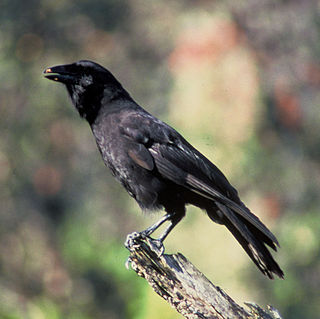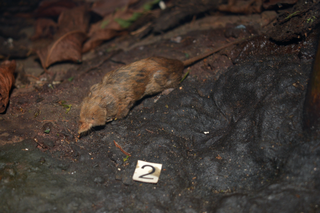
A species that is extinct in the wild (EW) is one that has been categorized by the International Union for Conservation of Nature as only consisting of living members kept in captivity or as a naturalized population outside its historic range. Classification requires exhaustive surveys conducted within the species' known habitat with consideration given to seasonality, time of day, and life cycle. Once a species is classified as EW, the only way for it to be downgraded is through reintroduction.
The Daghestan pine vole is a species of rodent in the family Cricetidae. It is found in Russia, Georgia, Armenia, and Azerbaijan.

The Somali hedgehog is a species of mammal in the family Erinaceidae. It is endemic to Somalia and Somaliland. The Somali hedgehog is nocturnal.

The Oriental shrew is a species of mammal in the family Soricidae. It is endemic to Indonesia.

The pale gray shrew is a species of mammal in the family Soricidae. It is endemic to Pakistan and is distributed in the Shigar valley and the western edge of Deosai.

Portenko's shrew is a species of mammal in the family Soricidae that is endemic to Russia.

The Caucasian shrew is a species of mammal in the family Soricidae. It is found in Armenia, Russia and Turkey.

The Lowe's shrew is a species of mammal in the family Soricidae. It is found in China, Myanmar, Thailand, and Vietnam.
Speleoperipatus is a monospecific genus of velvet worm in the Peripatidae family, containing the single species Speleoperipatus spelaeus. This species is a pale greenish yellow, almost white, with 22 or 23 pairs of legs and no eyes. Specimens range from 27 mm to 34 mm in length. The minimum number of leg pairs found in this species (22) is also the minimum number found in the neotropical Peripatidae. This velvet worm is viviparous, with mothers supplying nourishment to their embryos through a placenta.
Lyropupa anceyana is a species of air-breathing land snails, terrestrial pulmonate gastropod mollusks in the family Pupillidae. This species is endemic to the United States.
Lyropupa is a genus of air-breathing land snails, terrestrial pulmonate gastropod mollusks in the family Pupillidae.

Nesopupa is a genus of very small air-breathing land snails, terrestrial pulmonate gastropod mollusks in the subfamily Nesopupinae of the family Vertiginidae.
Nesopupa anceyana is a species of very small air-breathing land snail, a terrestrial pulmonate gastropod mollusk in the family Vertiginidae the whorl snails. This species is endemic to Hawaii in the United States.
Taipidon is a genus of small air-breathing land snails, terrestrial pulmonate gastropod molluscs in the family Endodontidae.

Stygobromus is a genus of amphipod crustaceans that live in subterranean habitats. The majority of the listed species are endemic to North America, a smaller number of species are also known from Eurasia. Most of the North American species live in areas which were not covered by the Laurentide Ice Sheet, although a few species seem to have survived under the ice. A number of species are on the IUCN Red List as endangered species (EN) or vulnerable species (VU); one species, S. lucifugus, is extinct.

A vulnerable species is a species which has been categorized by the International Union for Conservation of Nature as being threatened with extinction unless the circumstances that are threatening its survival and reproduction improve.

Endangered species, as classified by the International Union for Conservation of Nature (IUCN), are species which have been categorized as very likely to become extinct in their known native ranges in the near future. On the IUCN Red List, endangered is the second-most severe conservation status for wild populations in the IUCN's schema after critically endangered. In 2012, the IUCN Red List featured 3,079 animal and 2,655 plant species as endangered worldwide. The figures for 1998 were 1,102 and 1,197 respectively.











